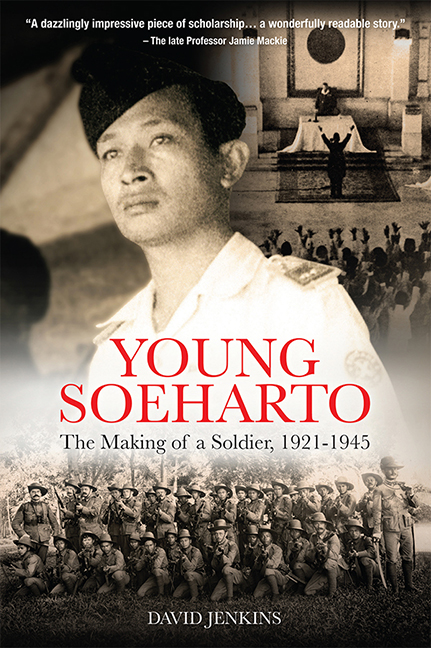Book contents
- Frontmatter
- Contents
- Foreword
- A Note on Spelling and Names
- A Note on Military Organization
- Maps
- List of Charts
- Preface
- Soeharto Family Tree
- 1 “The Sultan came to me and asked about that Family tree”
- 2 “The Cork on which the Netherlands Floats”
- 3 “They Regard Holland as a very Weak Power”
- 4 “An Invisible Motivating Force”
- 5 “What kind of Islam is this?”
- 6 “Soeharto is a Closed Book”
- 7 “I was Suited to the Disciplined life of the Military”
- 8 A Reassuringly Familiar World
- 9 A Policeman for the Japanese
- 10 An Armed Force Conjured out of Nothing
- 11 “The whole Island was Ablaze with Enthusiasm”
- 12 “Don’t make them too Strong!”
- 13 “Soeharto was a Cautious Man”
- 14 “Why did they Choose Soeharto?”
- Glossary and Abbreviations
- Notes
- Acknowledgements
- Bibliography
- Index
- About the Author
3 - “They Regard Holland as a very Weak Power”
Published online by Cambridge University Press: 09 October 2021
- Frontmatter
- Contents
- Foreword
- A Note on Spelling and Names
- A Note on Military Organization
- Maps
- List of Charts
- Preface
- Soeharto Family Tree
- 1 “The Sultan came to me and asked about that Family tree”
- 2 “The Cork on which the Netherlands Floats”
- 3 “They Regard Holland as a very Weak Power”
- 4 “An Invisible Motivating Force”
- 5 “What kind of Islam is this?”
- 6 “Soeharto is a Closed Book”
- 7 “I was Suited to the Disciplined life of the Military”
- 8 A Reassuringly Familiar World
- 9 A Policeman for the Japanese
- 10 An Armed Force Conjured out of Nothing
- 11 “The whole Island was Ablaze with Enthusiasm”
- 12 “Don’t make them too Strong!”
- 13 “Soeharto was a Cautious Man”
- 14 “Why did they Choose Soeharto?”
- Glossary and Abbreviations
- Notes
- Acknowledgements
- Bibliography
- Index
- About the Author
Summary
If Yogyakarta was the domain of the eighth sultan in the Hamengku Buwono line, it was home, too, of the Pakualaman, the minor court, which had been established with the blessing of the British after they captured Java during the Napoleonic Wars. In Surakarta (Solo), which lay forty miles to the northeast, was the Sunanate, which, like Yogyakarta, the Dutch administered separately from the rest of Java and which also had an attendant minor court, the principality of the Mangkunegaran. These four small courts were all that remained of the once powerful state of Mataram, which had in effect been drawn and quartered during years of palace intrigue and colonial intervention.
The Princely Territory of Yogyakarta—as distinct from the small city of the same name—was a compact and overwhelmingly rural kingdom with a sixty-mile-wide base on the Indian Ocean and, in the north, a triangle of territory extending up to the summit of Mount Merapi (9,550 feet), one of the most destructive of Indonesia's active volcanoes, of which there are 129 by one estimate. Almost perfectly conical, Merapi rises, blue and immense, out of the plains of Central Java twenty miles north of the city of Yogyakarta, a plume of volcanic gasses, ash and steam drifting from its peak. It is a striking reminder of both the beneficial and destructive forces of nature. In 1930, when Soeharto was nine, Merapi would erupt, killing more than 1,300 people.
In the city of Yogyakarta, which had a population of 136,000 in 1930, three quite distinct communities lived side by side, one European, one Javanese, the other Chinese. The Europeans, of whom there were around 5,600, exercised all political power and had their hands on the main economic levers, while going to some lengths to maintain the fiction that authority resided in the Sultan who, like his predecessors, concealed lack of power beneath a façade of court ceremony and by a cultivation of the traditional arts. Both the Dutch and the Javanese were much concerned with status, hierarchy, appearance, order and discipline. At the apex of the European social pyramid in Yogyakarta sat the Dutch Resident and his senior civil service officials, including a Dutch Assistant Resident.*
- Type
- Chapter
- Information
- Young SoehartoThe Making of a Soldier, 1921–1945, pp. 44 - 60Publisher: ISEAS–Yusof Ishak InstitutePrint publication year: 2021



